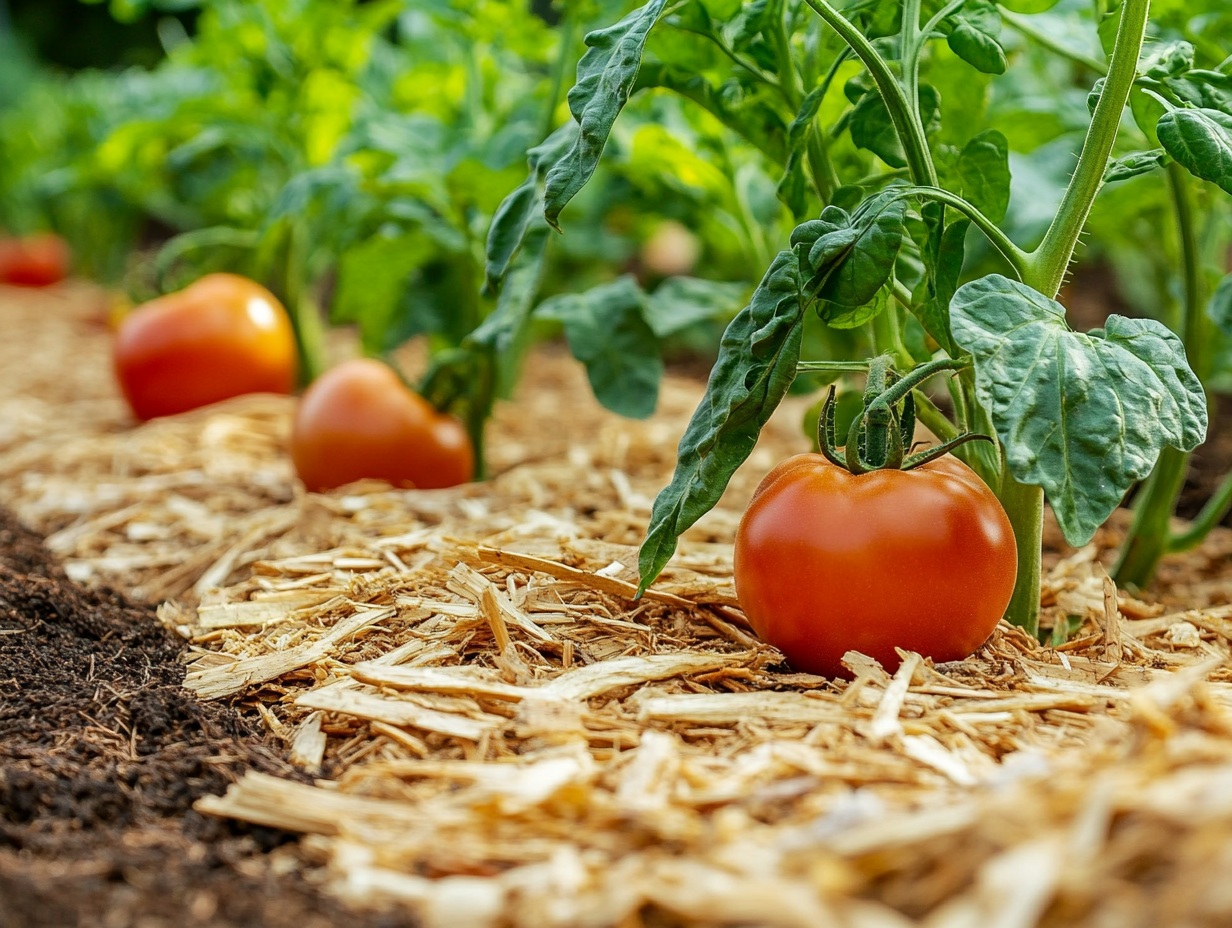The Benefits of Mulching Explained
In the world of gardening, mulching is often regarded as one of the most effective practices for maintaining a healthy and productive vegetable garden. But why use mulch in your vegetable garden, and what makes it so beneficial? In this comprehensive guide, we’ll explore the many advantages of mulching, types of mulch to consider, and how to apply it properly for optimal results.
The Importance of Mulching in a Vegetable Garden
Mulching involves covering the soil with a protective layer of material, either organic or inorganic, to improve soil health and plant growth. The benefits of mulching go far beyond aesthetics—it serves functional purposes that can lead to more robust and resilient vegetable gardens.
Key Benefits of Mulching
- Moisture Retention: Mulch helps to retain soil moisture by reducing evaporation, which means your plants require less frequent watering.
- Weed Suppression: A thick layer of mulch can significantly reduce the growth of weeds, saving you time and energy in maintaining your garden.
- Temperature Regulation: Mulch acts as an insulator, keeping the soil cooler during hot weather and warmer during cooler months.
- Soil Enrichment: Organic mulches decompose over time, adding essential nutrients back into the soil.
- Erosion Control: Mulch helps protect the soil from being washed away during heavy rains.
Types of Mulch for Your Vegetable Garden
When choosing mulch for your vegetable garden, understanding the different types available and their unique benefits is essential. Mulches can be broadly categorized as organic or inorganic.
Organic Mulch
Organic mulches are made from natural materials and decompose over time, enriching the soil with nutrients.
- Wood Chips and Bark: These materials are long-lasting and effective at suppressing weeds. They work best around perennial plants or pathways.
- Straw: Ideal for vegetable gardens, straw is lightweight, easy to apply, and effective in retaining moisture and suppressing weeds.
- Compost: A nutrient-rich mulch that feeds the soil as it breaks down, compost can be spread around plants for added fertility.
- Grass Clippings: A readily available option that provides nitrogen as it decomposes. Be sure to use grass that hasn’t been treated with pesticides.
Inorganic Mulch
Inorganic mulches do not decompose, so while they don’t add nutrients to the soil, they do provide long-lasting coverage.
- Landscape Fabric: A practical choice for weed control. It should be covered with an organic layer for better aesthetics and to prevent it from heating up the soil.
- Gravel and Pebbles: Ideal for pathways or garden borders, they help with drainage and reduce weed growth but can heat up the soil in sunny climates.
- Plastic Sheeting: Black plastic is commonly used to suppress weeds and retain moisture, though it can raise soil temperature significantly.
How to Apply Mulch Properly
Applying mulch correctly can maximize its benefits. Here’s a step-by-step guide on how to use mulch effectively in your vegetable garden.
Step-by-Step Mulching Guide
- Prepare the Soil: Remove any existing weeds and water the soil thoroughly before applying mulch.
- Choose the Right Mulch: Select an appropriate type of mulch based on the needs of your garden.
- Apply the Mulch Layer: Spread a layer of mulch about 2-4 inches thick around your plants. Be careful not to pile it up against the stems of your plants, as this can encourage rot.
- Leave Space Around Stems: Ensure there is a gap of about 2 inches between the mulch and the plant stems to promote airflow and prevent moisture buildup.
- Reapply as Needed: Organic mulches decompose over time, so check regularly and add more as necessary to maintain the optimal depth.
Tips for Effective Mulching
- Avoid Over-Mulching: Applying mulch too thickly can suffocate the soil and lead to root rot.
- Monitor Moisture Levels: Even though mulch helps retain moisture, you should still check the soil regularly to avoid waterlogged conditions.
- Mix and Match Mulches: Consider combining different types of mulch to reap multiple benefits, such as using straw for moisture retention and compost for nutrient enrichment.
The Benefits of Organic Mulch
Organic mulches are favored for their ability to enhance soil health as they decompose. Here’s how they can benefit your vegetable garden:
Nutrient-Rich Soil
As organic mulches break down, they feed the soil with valuable nutrients like nitrogen, phosphorus, and potassium. This can improve plant growth and reduce the need for synthetic fertilizers.
Improved Soil Structure
The decomposition process encourages the formation of humus, which enhances soil structure, promoting better water retention and aeration.
Biodiversity Boost
Organic mulch supports a thriving ecosystem of beneficial insects and microorganisms that break down organic matter and enrich the soil.
Managing Weeds with Mulch
One of the most compelling reasons to use mulch in your vegetable garden is its ability to suppress weed growth. Mulch creates a physical barrier that blocks sunlight, preventing weed seeds from germinating.
Best Practices for Weed Suppression
- Apply a Thick Layer: Ensure the mulch layer is at least 2 inches thick to effectively smother weeds.
- Combine with Landscape Fabric: For areas prone to persistent weeds, using landscape fabric beneath a layer of organic mulch can offer extra protection.
- Regular Maintenance: Remove any weeds that manage to break through the mulch layer to prevent them from spreading.
Seasonal Mulching Strategies
Different seasons call for different mulching strategies to maximize the benefits for your vegetable garden.
Mulching in the Spring
Applying mulch in the spring helps to lock in moisture as temperatures rise and prevent the growth of early-season weeds.
- Compost and Straw: Ideal for feeding plants and conserving water as the weather warms up.
- Avoid Heavier Mulches: Use lightweight mulches in the spring to allow the soil to warm up faster.
Summer Mulching Tips
Mulching during the summer can help keep the soil cool and reduce the need for frequent watering.
- Wood Chips: Great for pathways and around more established plants.
- Grass Clippings: These can be applied in thin layers to prevent them from matting and creating a barrier to water penetration.
Fall and Winter Mulching
In colder months, mulch helps insulate the soil and protect plant roots from frost.
- Leaf Mulch: Fallen leaves can be shredded and used as mulch, providing insulation and slowly decomposing to enrich the soil.
- Heavier Mulches: Materials like bark or straw can be applied thicker in the fall to safeguard perennial plants.
Environmental and Economic Benefits of Mulching
Using mulch in your vegetable garden is not just beneficial for your plants but also offers broader environmental and economic advantages.
Sustainability
Organic mulches made from recycled or locally sourced materials are eco-friendly and reduce waste. By using natural materials like wood chips, grass clippings, or compost, you minimize your garden’s carbon footprint.
Cost Savings
While some mulches, such as bark or compost, may require an initial investment, the long-term benefits include reduced water usage and less money spent on fertilizers and weed control.
Common Mulching Mistakes to Avoid
Even though mulching is relatively simple, some common mistakes can hinder its effectiveness:
- Using Treated Wood Chips: These may contain chemicals that can leach into the soil and harm plants.
- Mulching Too Early: Applying mulch too early in the season can prevent the soil from warming up in spring.
- Not Replenishing Mulch: Forgetting to replace mulch as it decomposes can reduce its effectiveness in moisture retention and weed suppression.


Leave a Reply